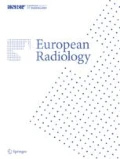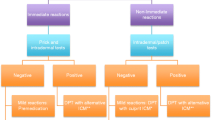Abstract
Definition
Late adverse reactions (LAR) to contrast media (CM) are defined as reactions occurring 1 h to 1 week after exposure.
Need for review
In view of more prospective studies of LAR and new data about their pathophysiology, the Contrast Medium Safety Committee (CMSC) of the European Society of Urogenital Radiology (ESUR) reviewed the literature on LAR and updated their guidelines.
Clinical features and pathology
LAR after CM include symptoms such as nausea, vomiting, headache, itching, skin rash, musculoskeletal pain, and fever. Skin reactions are well-documented LAR to CM with an incidence of approximately 2%–4% after nonionic monomers. LAR are commoner by a factor of three to four after nonionic dimers. The commonest skin reactions are maculopapular rashes, erythema and skin swelling. These reactions are T cell-mediated immune reactions, and the diagnosis may be confirmed using skin tests (patch or delayed reading intradermal). The main risk factors for LAR are a previous reaction to contrast medium, a history of allergy, and interleukin-2 treatment. Most skin reactions are mild or moderate and self-limiting.
Management
Management is symptomatic and similar to the management of other drug-induced skin reactions. To reduce the risk of repeat reactions avoidance of the relevant CM and any cross-reacting agents identified by skin testing is recommended.
Similar content being viewed by others
References
Panto PN, Davies P (1986) Delayed reactions to urographic contrast media. Br J Radiol 59:41–44
Webb JAW, Stacul F, Thomsen HS, Morcos SK, Members of the contrast media safety committee of the European Society of Urogenital Radiology (ESUR) (2003) Late adverse reactions to intravascular iodinated contrast media. Eur Radiol 13:181–184
Stacul F (2009) Late adverse reactions. In: Thomsen HS, Webb JA (eds) Contrast media. Safety issues and ESUR guidelines, 2nd revised edition. Springer, Berlin, pp 123–127
Namasivayam S, Kalra MK, Torres WE, Small WC (2006) Adverse reactions to intravenous iodinated contrast media: a primer for radiologists. Emerg Radiol 12:210–215
Idée JM, Pinès E, Prigent P, Corot C (2005) Allergy-like reactions to iodinated contrast agents. A critical analysis. Fundam Clin Pharmacol 19:263–281
Khachman D, Gandia P, Sallerin F, Mailly F (2009) Mise au point sur les réactions d’hypersensibilité immédiate et tardive aux produits de contraste iodés. Thérapie 64:331–339
Guéant-Rodriguez RM, Romano A, Barbaud A et al (2006) Hypersensitivity reactions to iodinated contrast media. Curr Pharm Des 12:3359–3372
Bohm I, Schild HH (2006) A practical guide to diagnose lesser-known immediate and delayed contrast media-induced adverse cutaneous reactions. Eur Radiol 16:1570–1579
Beyer-Enke SA, Zeitler E (1993) Late adverse reactions to non-ionic contrast media: a cohort analytic study. Eur Radiol 3:237–241
Yasuda R, Munechika H (1998) Delayed adverse reactions to non-ionic monomeric contrast-enhanced media. Invest Radiol 33:1–5
Ueda S, Mori H, Matsumoto S et al (2001) True delayed adverse reactions to non-ionic contrast media: does it really exist? Eur Radiol Suppl 11:377
Schild H (1996) Delayed allergy-like reactions in patients: monomeric and dimeric contrast media compared with plain CT. Eur Radiol 6:9–10
Schild HH, Kuhl CK, Hubner-Steiner U et al (2006) Adverse events after unenhanced and monomeric and dimeric contrast-enhanced CT: a prospective randomized controlled trial. Radiology 240:56–64
Loh S, Bagheri S, Katzberg RW, Fung MA et al (2010) Delayed adverse reaction to contrast-enhanced CT: a prospective single-center study comparison to control group without enhancement. Radiology 255:764–771
Higashi TS, Katayama M (1990) The delayed adverse reactions of low osmolar contrast media. Nippon Igaku Hoshasen Gakkai Zasshi 50:1359–1366
Choyke PL, Miller DL, Lotze MT et al (1992) Delayed reactions to contrast media after interleukin-2 immunotherapy. Radiology 183:111–114
Yoshikawa H (1992) Late adverse reactions to nonionic contrast media. Radiology 183:737–740
Cochran ST, Cugley AL, Kiourmehr F (1993) Delayed reactions in patients receiving non-ionic contrast media. Adv X-ray Contrast 1:61–62
Mikkonen R, Kontkanen T, Kivisaari L (1995) Acute and late adverse reactions to low-osmolal contrast media. Acta Radiol 36:72–76
Pedersen SH, Svaland MG, Reiss A-L, Andrew E (1998) Late allergy-like reactions following vascular administration of radiography contrast media. Acta Radiol 39:344–348
Rydberg J, Charles J, Aspelin P (1998) Frequency of late allergy-like adverse reactions following injection of intravascular non-ionic contrast media. A retrospective study comparing a non-ionic monomeric contrast medium with a non-ionic dimeric contrast medium. Acta Radiol 39:219–222
Bartolucci F, Cecarini M, Gabrielli G et al (2000) Reazioni tardive a un mezzo di contrasto radiologico (iopamidolo). Radiol Med 100:273–278
Hosoya T, Yamaguchi K, Akutzu T et al (2000) Delayed adverse reactions to iodinated contrast media and their risk factors. Radiat Med 18:39–45
Munechika H, Hiramatsu Y, Kudo S, Sugimura K et al (2003) A prospective survey of delayed adverse reactions to iohexol in urography and computed tomography. Eur Radiol 13:185–194
Munechika H, Hiramatsu M, Nakamura H et al (1999) Large-scale study of delayed adverse events to non-ionic contrast medium, iohexol: incidence and risk factors of adverse events following non-interventional radiography. Eur Radiol 9:440
Sutton AGC, Finn P, Campbell PG et al (2003) Early and late reactions following the use of Iopamidol 340, Iomeprol 350 and Iodixanol 320 in cardiac catheterization. J Invasive Cardiol 5:133–138
Yamaguchi K, Takanashi I, Kanauchi T et al (1992) A retrospective survey of delayed adverse reactions to ionic and nonionic contrast media. Nippon Igaku Hoshasen Gakkai Zasshi 52:1565–1570
McCullough M, Davies P, Richardson R (1989) A large trial of intravenous Conray 325 and Niopam 300 to assess immediate and delayed reactions. Br J Radiol 62:260–265
Bertrand P, Delhommais A, Alison D, Rouleau P (1995) Immediate and delayed tolerance of iohexol and ioxaglate in lower limb phlebography: a double-blind comparative study in humans. Acad Radiol 2:683–686
Oi H, Yamazaki H, Matsushita M (1997) Delayed vs immediate adverse reactions to ionic and non-ionic low-osmolality contrast media. Radiat Med 15:23–27
Sutton AGC, Finn P, Grech ED et al (2001) Early and late reactions after the use of iopamidol 340, ioxaglate 320 and iodixanol 320 in cardiac catheterization. Am Heart J 141:677–683
Lapi F, Cecchi E, Pedone C, Attanasio F et al (2008) Safety aspects of iodinated contrast media related to their physicochemical properties: a pharmacoepidemiology study in two Tuscany hospitals. Eur J Clin Pharmacol 64:723–737
Fransson SG, Stenport G, Andersson M (1996) Immediate and late adverse reactions in coronary angiography. A comparison between iodixanol and ioxaglate. Acta Radiol 37:218–222
Niendorf HP (1996) Delayed allergy-like reactions to X-ray contrast media. Problem statement exemplified with iotrolan (Isovist) 280. Eur Radiol 6:S8–S10
Bigby M, Jick S, Jick H, Arndt K (1986) Drug induced cutaneous reactions. A report from the Boston Collaborative Drug Surveillance Program on 15,438 consecutive inpatients, 1975–1982. J Am Med Assoc 256:3358–3363
Christiansen C, Pichler WJ, Skotland T (2000) Delayed allergy-like reactions to X-ray contrast media: mechanistic considerations. Eur Radiol 10:1965–1975
Kanny G, Pichler W, Morisset M et al (2005) T-cell mediated reactions to iodinated contrast media: evaluation by skin and lymphocyte activations tests. J Allergy Clin Immunol 115:179–185
Romano A, Viola M, Gaeta F, Rumi G et al (2008) Patch testing in non-immediate drug eruptions. Allergy Asthma Clin Immunol 4:66–74
Brockow K, Romano A, Aberer W, Bricher AJ et al (2009) Skin testing in patients hypersensitivity reactions to iodinated contrast media—a European multicenter study. Allergy 64:234–241
Brockow K, Christiansen C, Kanny G et al (2005) Management of hypersensitivity reactions to iodinated contrast media. Allergy 60:150–158
Christiansen C (2002) Late-onset allergy-like reactions to X-ray contrast media. Curr Opin Allergy Clin Immunol 2:333–339
Watanabe H, Sueki H, Nakada T et al (1999) Multiple fixed drug eruption caused by iomeprol (Iomeron), a nonionic contrast medium. Dermatology 198:291–294
Brockow E, Becker EW, Worret W-I, Ring J (1999) Late skin test reactions to radiocontrast medium. J Allergy Clin Immunol 104:1107–1108
Akiyama M, Nakada T, Sueki H et al (1998) Drug eruption caused by nonionic iodinated X-ray contrast media. Acad Radiol 5:S159–S161
Courvoisier S, Bircher AJ (1998) Delayed-type hypersensitivity to a nonionic, radiopaque contrast medium. Allergy 53:1221–1224
Gall H, Pillekamp H, Peter R-U (1999) Late-type allergy to the X-ray contrast medium Solutrast (iopamidol). Contact Dermatitis 40:248–250
Vernassiere C, Trechot P, Commun N et al (2004) Low negative predictive value of skin tests in investigating delayed reactions to radio-contrast media. Contact Dermatis 50:359–366
Antunez C, Barbaud A, Gomez E et al (2011) Recognition of iodixanol by dendritic cells increases the cellular response in delayed allergic reactions to contrast media. Clin Exp Allergy 41:657–664
Goodfellow T, Holdstock GE, Brunton FJ, Bamforth J (1986) Fatal acute vasculitis after high-dose urography with iohexol. Br J Radiol 59:620–621
Reynolds NJ, Wallington TB, Burton JL (1993) Hydralazine predisposes to acute cutaneous vasculitis following urography with iopamidol. Br J Dermatol 129:82–85
Savill JS, Barrie R, Ghosh S et al (1988) Fatal Stevens-Johnson syndrome following urography with iopamidol in systemic lupus erythematosus. Postgrad Med J 64:392–394
Sadi AM, Toda T, Kiyuna M et al (1995) An autopsy case of malignant lymphoma with Lyell’s syndrome. J Dermatol 22:594–599
Conroy RM, Bjartveit K, Sheppick A et al (1994) Iodixanol in intravenous urography: a comparison of iodixanol 270 mg I/ml, iodixanol 320 mg I/ml and iopamidol 300 mg I/ml (NIOPAM). Clin Radiol 49:337–340
Fischbach R, Landwehr P, Lackner K et al (1996) Iodixanol vs iopamidol in intravenous DSA of the abdominal aorta and lower extremity arteries: a comparative phase III trial. Eur Radiol 6:9–13
Rosado A, Canto G, Veleiro B, Rodriguez J (2001) Toxic epidermal necrolysis after repeated injections of iohexol. Am J Roentgenol 176:262–263
Schick E, Weber L, Gall H (1996) Delayed hypersensitivity reaction to the non-ionic contrast medium iopromid. Contact Dermatitis 35:312
Sedano E, Vega JM, Rebollo S et al (2001) Delayed exanthema to nonionic contrast medium. Allergy 56:1015–1016
Kanny G, Marie B, Hoen B et al (2001) Delayed adverse reaction to sodium ioxaglic acid-meglumine. Eur J Dermatol 11:134–137
Aoki Y, Takemura T (2002) Allergies correlated to adverse reactions induced by nonionic monomeric and ionic dimeric contrast media for contrast enhanced CT examinations. Radiol Technol 58:1245–1251
Mikkonen R, Vehmas T, Granlund H, Kivisaari L (2000) Seasonal variation in the occurrence of late adverse skin reactions to iodine-based contrast media. Acta Radiol 41:390–393
Vavricka SR, Halter J, Furrer K et al (2002) Contrast media triggering cutaneous graft-versus-host disease. Bone Marrow Transplant 29:899–901
Fishman JE, Aberle DR, Moldawer NP et al (1991) Atypical contrast reactions associated with systemic interleukin-2 therapy. Am J Roentgenol 156:833–834
Oldham RK, Brogley J, Braud E (1990) Contrast medium “recalls” interleukin-2 toxicity. J Clin Oncol 8:942–943
Shulman KL, Thompson JA, Benyunes MC et al (1993) Adverse reactions to intravenous contrast media in patients treated with interleukin-2. J Immunother Emphasis Tumor Immunol 113:208–212
Zukiwski AA, David CL, Coan J et al (1990) Increased incidence of hypersensitivity to iodine-containing radiographic contrast media after interleukin-2 administration. Cancer 65:1521–1524
Schnyder B, Frutig K, Mauri-Hellweg D et al (1998) T-cell mediated cytotoxicity against keratinocytes in sulfamethoxazol-induced skin reaction. Clin Exp Allergy 28:1412–1417
Author information
Authors and Affiliations
Consortia
Corresponding author
Additional information
Members of the Committee: H.S. Thomsen (Chairman, Denmark), S.K. Morcos (Secretary, United Kingdom), T. Almén (Sweden), P. Aspelin (Sweden), M.F. Bellin (France), O. Clement (France), G. Heinz-Peer (Austria), P. Reimer (Germany), F. Stacul (Italy), A.J. van der Molen (the Netherlands), J.A.W. Webb (United Kingdom). Consultants to the committee: J-M Idée (Guerbet, France), P. Lengsfeld (Bayer Schering Pharma, Germany), A. Spinazzi (Bracco, Italy), ESUR: www.esur.org
Rights and permissions
About this article
Cite this article
Bellin, MF., Stacul, F., Webb, J.A.W. et al. Late adverse reactions to intravascular iodine based contrast media: an update. Eur Radiol 21, 2305–2310 (2011). https://doi.org/10.1007/s00330-011-2200-9
Received:
Revised:
Accepted:
Published:
Issue Date:
DOI: https://doi.org/10.1007/s00330-011-2200-9




